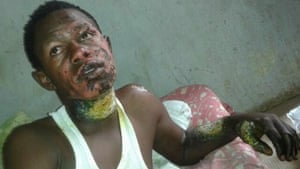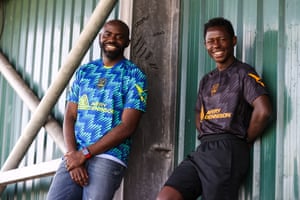An upcoming trial for Newcastle was on Jacob Viera’s mind when he returned home from training with Kenyan Premier League team Tena United on 10 June 2014. As he reached for the front door handle on his Nairobi apartment, life was also about to turn. “I opened the door and ‘Bang!’” he says. “I was electrocuted.” Live wires had been connected to the handle from an electrical socket. A few years earlier he had refused to smuggle drugs into Tanzania while playing for Kenya’s Under-16s national team. The electric shock was punishment from the gang he defied.
Somehow, after being unconscious, in hospital for a month and with his face, neck and arm all scorched, Viera made that trial in August 2014. “There’s no way you turn a trial down with Newcastle, even after all this. My visa and flights had all been sorted,” he says, incredulous at the thought he might have passed up the opportunity.
“My dad always feared something like this would happen because it had happened to other players who refused to cooperate with the drugs gangs. They will assault you or kill you. But I went to Newcastle’s academy and one of the managers wanted to know why I had pink skin on my face, my neck and my arm. I didn’t look like that on any of the pictures or videos they had when they invited me for the trial.
“I gave him all the details of what happened and he felt sorry for me. He said that even if Newcastle signed me I would have to go back to Kenya for a month but he didn’t want me to go back. It was too dangerous. He said I would be safer if I claimed asylum but that meant I wasn’t allowed to sign a professional contract until I was granted UK residency.
“A week later the Home Office got me a Megabus ticket to London. I stayed in a hotel with 600 other asylum seekers for two weeks and then I was in Hammersmith detention centre for three weeks.”

Six years and many ordeals later, the 24-year-old remains in football and grateful for the doors it opened, although the career is not what he had envisaged in Kenya. His chance with Newcastle went while in London, where another arose when he was spotted by a Tottenham scout.
On the day of his scheduled trial for Spurs, Viera was summoned for a second screening interview at the Home Office. He was detained and his phone confiscated. Another chance gone. Next, he was driven in the middle of the night to Liverpool for a medical to assess whether his scars were consistent with an electric shock.
He trained with Everton Under-18s and played for local sides while awaiting the Home Office’s decision. During that time he ruptured his ACL. Third strike and out. But thanks to friendships made at Everton, chiefly with Stuart Carrington, a former academy coach who now works for Liverpool County FA (LCFA), Viera is now a level four referee on the FA’s Core programme, which provides training and education for those with “clear potential and opportunity to progress”. He is a UK resident too.
We meet at Walton Hall Park, headquarters of LCFA, where Viera is officiating a match between former refugees from Syria, Somalia, Egypt, Eritrea, Iran and Sudan. LCFA works closely with Asylum Link Merseyside to help refugees and asylum seekers – organising teams, offering coaching qualifications and the referees’ course Viera started out on – but today’s game is to promote the work of Klabu, an organisation that builds clubhouses and provides sports equipment in refugee camps across Africa.
Klabu, which means club in Swahili, built its first clubhouse in the Kalobeyei Refugee Settlement in Kenya in 2019. The settlement is home to 36,000 refugees from 13 African countries. The KLABU Foundation operates on a non-profit basis and funds are raised through donations and the sale of its own merchandise, which is to receive a significant publicity boost from FIFA 21. The latest edition of the game will feature the Klabu Kalobeyei Spirit kit for players to unlock – they can also buy the physical version – and Trent Alexander-Arnold, Alexandre Lacazette and César Azpilicueta have given their support to the initiative on social media. The kit’s sponsor, the sportswear labelling manufacturer Avery Dennison, have helped ensure refugees can play the game in the settlement by providing new consoles and TVs.
On the sidelines at Walton Hall Park stands Klabu’s new ambassador, Fabrice Muamba. The queue of players asking for selfies is a reminder there is more to Muamba’s story than the cardiac arrest that ended his career in 2012. For these former refugees in Liverpool, the former Bolton midfielder and the referee Viera are beacons of hope.
“I was a refugee,” says Muamba, who moved to England from the Democratic Republic of Congo aged 11. “My father was a refugee who came to England seeking asylum for himself and his family so it was a no-brainer for me to support these guys and to show there is a positive end to the story.
“I am one of the positives. I have been fortunate to make the most of the opportunity that England has given me, to make a living and to be able to support my family. For these guys today is not just an opportunity to play football, it is a chance to mingle with each other and raise awareness of the work Klabu are doing. It is valuable to so many people.

“Football gives you the environment to meet new people. When I started going to school, all they knew me as was the big African boy. That’s what I was called. Football paved the way for me to make friends, to improve my English, to socialise and to break a lot of barriers.”
Muamba, now a PFA delegate, admits the difficulties facing refugees are greater now than his own experience given the political climate. “I can see why people feel they are coming over to take their jobs but these people are coming here for opportunities,” he says. “And if these people had better opportunities in their own country I’m sure they would stay there. If I didn’t come to Britain it would have been very difficult for me to achieve what I did.
“I can see the difficulties they will face, and it is very important to see light at the end of the tunnel, but my advice to them is that you have to come in with a purpose, to want to make a difference.”
Football, through the friendships made and the courses provided by LCFA, has given Viera the opportunity to do just that. As a level four referee he will officiate in the North West Counties League, the Cheshire League and the Liverpool County Premier League this season. The ultimate ambition is to fulfil a promise made to an immigration officer at the detention centre. “He was called Michael Kanyako and he’d tell me: ‘If you stay in the UK I will definitely see you in the professional league’,” Viera says. “One day I want to make Michael proud by refereeing in the professional league.
“Someone said to me I should try to be a player because there are no black referees in the Premier League and the Football League, but I enjoy this, I want to do this. I have been nominated to go on the FA Core programme, which is a centre of excellence for referees. You are given proper training on positioning, movement and managing the game. And you get opportunities. I refereed England under-16s at Port Vale, which I will always value.
“I won’t let this go. I was prevented from going on a playing career but this path is even better for me. Everything happens for a reason. I always say I was given two lives, just like Fabrice. I remember watching that game at White Hart Lane when I was 16. When I was electrocuted, I wasn’t meant to survive, but I recovered within a month. I came here and now I meet people who I used to see on TV. It is not where I expected to be but I am so grateful.”
The biggest barrier Muamba faced when settling in London was language. “The only words I knew were ‘Hello, how are you?’ and I was dreading my first week at school,” he says. “But football helped massively. Some of the first words you learn through football are swear words, so that’s not the best, but it helped you communicate and make friends.”
That is another experience he shares with Viera, although the charismatic referee’s problem was not with English but the more localised challenges of scouse.
“Am I allowed to swear?” he asks before recalling one episode. “I was new to Liverpool and asked if I could join a seven-a-side game in Wavertree. Right at the end I scored a rabona. Top bin. I’m only 5ft 6 and one of my team-mates was massive, about 6ft 7. He came running at me shouting: ‘You’re fucking sick lad, come and play for us lad.’ I was scared. He was aggressive and I didn’t know what he meant. Was I sick?
“I was quite down afterwards and explained to my social worker what had happened. He started laughing. ‘Welcome to Liverpool lad,’ he said and told me that sick meant great or fantastic.
“After that I started to learn scouse but I didn’t pick up the accent. Scousers can’t finish a sentence without swearing and I don’t swear, but I love Scousers and I love this place. Now I am going to be a sick referee.”
from Football | The Guardian https://ift.tt/36Fzypf
via IFTTT

No Comment